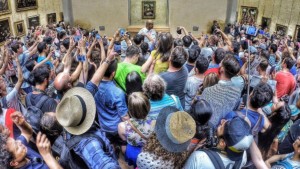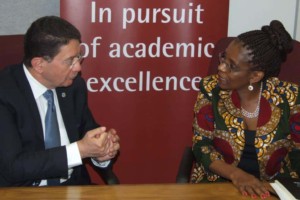55 ways tourism can be friendlier to the environment: An ‘Eco-Guide’
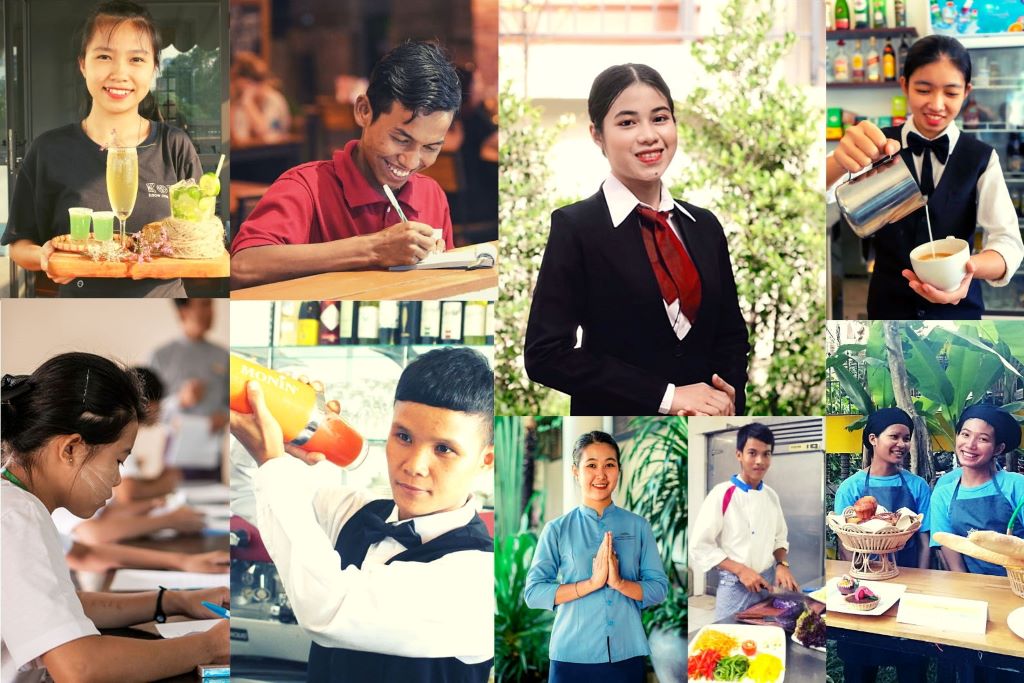
“Good Tourism” Insight Partner ASSET‑H&C has published the free Eco-Guide for Hospitality Businesses and Schools, which lays out 55 tips for reducing tourism’s negative effects on the environment. Sophie Hartman, Nguyễn Thị Thu Thảo, and Võ Thị Quế Chi describe the why, the how, and a few of the what in this “GT” Insight.
[Scroll down for the free downloads]
In view of COVID-19 and its ongoing impacts, increasing sustainability has become more relevant and urgent than ever before for the tourism industry.
By training the responsible workers of tomorrow and implementing green practices in their own operations, educational institutions can accelerate the sector’s transition to a more environmentally-responsible business model.
Before COVID-19 there were obvious signs throughout Southeast Asia that tourism had a large and often negative affect on the environment:
For example, in Thailand, pollution from litter, boats, and sunscreen is estimated to have destroyed more than 80% of the coral surrounding the world-famous Maya Bay in Krabi. The bay used to receive up to 200 boats and 5,000 tourists a day. However, since 2018, the site has been closed to allow it to recover from the damage caused by tourists. It may reopen on January 1, 2022, with a new pier and regulations.

In Cambodia, the iconic Angkor Wat temple is at risk of collapse due to environmental threats. Increasing water demand from visitors and residents of nearby Siem Reap have resulted in shortages, forcing the authorities to tap into groundwater. As the water table of the area lowers, the ground becomes less stable.
The COVID-19 crisis has been considered by many as a wake-up call for the industry. It has made tourism’s influence on the economy, society, and environment even more obvious. It has also highlighted the fragility of the natural environment and the need for conservation.
The time for deep social and environmental change has come. The downtime in global tourism activities has offered a golden opportunity for such change to happen.
Also see John Morris Williams’ “GT” Insight
“How to make a hotel green & responsible: Get on with it!”
Intensifying demands, evolving practices
The Association of Southeast Asian Social Enterprises for Training in Hospitality & Catering (ASSET‑H&C) is a regional network of vocational schools that provide a path to employment in the tourism and hospitality sector for vulnerable youth. Besides offering disadvantaged populations a means of social mobility, its members also strive to shape a new generation of responsible tourism workers.
In these schools, students learn both technical skills and transversal competencies (‘soft skills’) to become not only highly skilled professionals but also responsible and autonomous adults who can be agents of their own development.
The schools also champion greener and more sustainable tourism practices and incorporate them into their training and operations to inspire students to take actions.
Here are some examples of their good practices:
Water, energy, and plastic awareness at Sala Baï
The behaviour of every member of a school community significantly impacts energy and water consumption. At Sala Baï Hotel and Restaurant School in Siem Reap particular attention is paid to involving all stakeholders in more responsible practices.
Also see Nguyễn Thị Thu Thảo’s “GT” Travel Experience
“The luxury of simply feeling good in Siem Reap”
The awareness of all occupants of the school facilities — staff, students, and customers of the school’s social business — is raised through training sessions and signs across the infrastructures to explain the importance of saving resources for both environmental and financial purposes.
In their rooms, customers can enjoy amenities — coffee, tea, soap — that are produced locally and offered in non-plastic containers. Suppliers are provided with bags made out of old fabric for them to avoid using plastic bags for deliveries at the school.
HCTC bans plastic packaging, straws
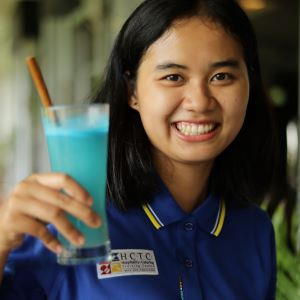
Various ASSET‑H&C members also implement initiatives to reduce waste while supporting their community.
As the most effective way to minimise waste is to refuse to use non-recyclable and single-use products, the Hospitality and Catering Training Center in Mae Sot, Thailand has banned plastic packaging and straws.
Instead, the school uses bamboo straws produced by refugee communities in the border town, including students’ families.
Also see Sophie Hartman’s
“Five-star dining in surprising Mae Sot”
EHT Paul Dubrule’s kitchen waste becomes compost, fuel, soap
École d’Hôtellerie et de Tourisme Paul Dubrule in Siem Reap separates food waste to make compost that is later used in their green areas.
The school also partners with the social enterprise Naga Earth to recycle cooking oil into biodiesel. This ensures that used oils from the kitchen are not discharged into the surrounding environment or re-used by other food vendors, which would be unsafe. The biodiesel is sold at local market prices as fuel for transport or generators.
Naga Earth also uses the oil to produce soap that is given to children through the hygiene programs of partner NGOs.
Also see Lauren Kharouni’s “GT” Insight
“Save money, satisfy guests, & join the fight against food waste”
Natural wastewater treatments at Inle Heritage
In Inle Lake, Myanmar the development of tourism has created a necessity to adapt sanitation practices. Inle Heritage has developed a wetland wastewater solution that is embedded in its facilities. Wastewater moves from section to section by gravity and is cleaned by plants — some sourced from the lake itself — and the microorganisms that live on these plants. This solution presents a sustainable model for the lake’s businesses and residents to properly deal with wastewater. The system is cheap to construct, uses no chemicals, and requires low maintenance and no electricity.
Only local organic vegetables at Bayon Bakery and Pastry School
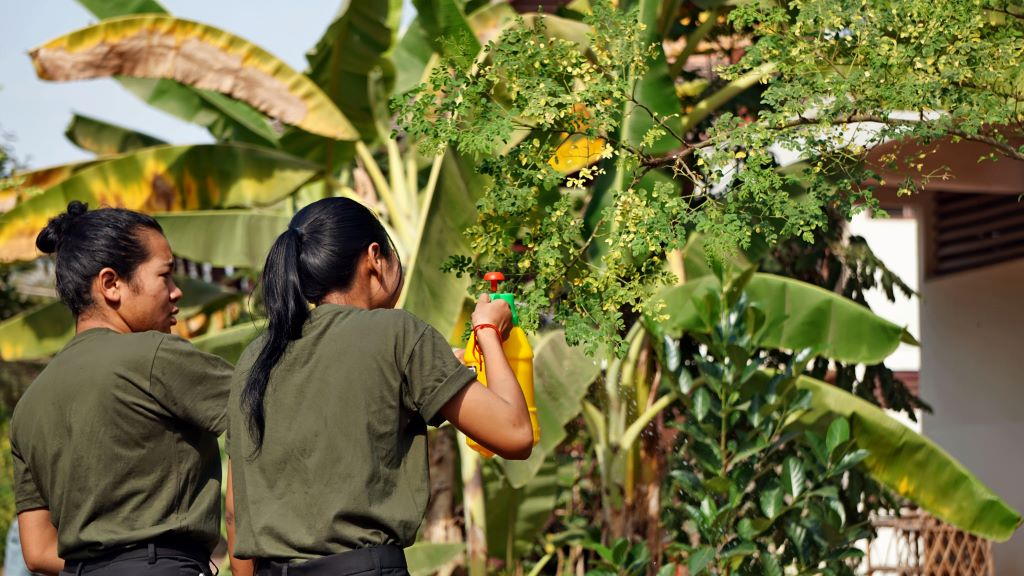
Finally, the café of Bayon Bakery and Pastry School in Siem Reap uses organic vegetables that are grown by female farmers trained in agro-ecology as part of another program of the NGO Bayon Education and Development. Not only do these fresh and healthy products appeal to many customers, but sourcing raw products locally also limits the café’s environmental footprint and contributes to the local economy.
Also see Sophie Hartman’s “GT” Travel Experience
“If treats make you weak, beware these strong women in Siem Reap”
Knowledge exchange and capacity building
One of ASSET‑H&C’s missions is to leverage members’ commitment to sustainable practices and support them through knowledge exchange and capacity building.
This creates a favourable environment for teaching sustainability principles and practices across all members. Students can learn about current sustainable development issues and receive training in the best solutions of the time.
In 2017, at the request of members, the network launched the Ecospitality initiative to help them become pioneers in environmentally responsible tourism. As an initial step, 10 member schools undertook environmental audits in collaboration with Artelia Engineering Company. The process assessed schools’ environmental footprints, identified good practices, and provided guidance on taking concrete and easy-to-implement actions to reduce electricity and water consumption and improve waste management.
Good practices drawn from the observations and recommendations of Artelia were then compiled into an Eco-Guide for Hospitality Businesses and Schools. The guide assists hospitality and tourism stakeholders on their journey to becoming eco-friendlier and more sustainable. It includes 55 tips and good practices to reduce the impact of tourism on the environment while making significant financial savings with easy-to-implement actions, accessible to anyone regardless of their technical background.
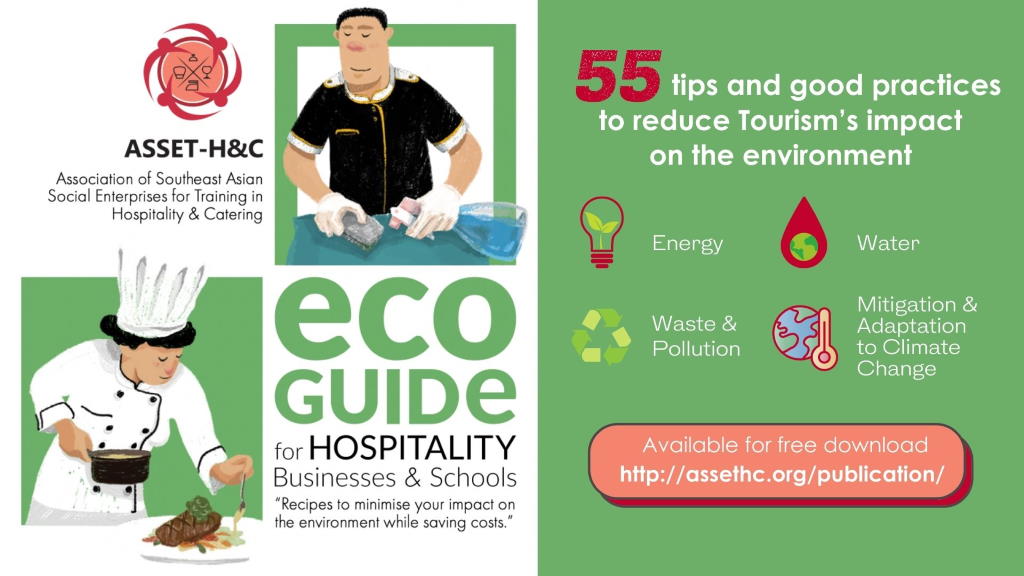
The Eco-Guide was originally published in English. To foster an inclusive approach to sustainability and to make it accessible to a wider audience, it has now been translated into Burmese, Khmer, Thai, and Vietnamese. The contribution of Australian Volunteers International, GoGreen Cambodia, Hospitality and Catering Training Centre, Myanmar Responsible Tourism Institute, Phuket Hotels Association, Sach va Xanh, and Sala Baï Hotel and Restaurant School made the translations possible.
The growing demand for environmentally-responsible tourism is more than just a trend; it represents a shift in customers’ awareness about a global emergency.
Tourism providers are adapting. Goods and services that respond to this demand and contribute to making a positive impact will become predominant.
To accompany tourism providers on this pathway toward greater sustainability, ASSET‑H&C members contribute by training tourism professionals on sustainability.
And, through the Eco-Guide, ASSET‑H&C hopes to provide accessible and easy guidance for tourism businesses to start taking action.
The translations of the Eco-Guide are now available for free download on ASSET‑H&C’s publications web page.
What do you think? Share a short anecdote or comment below. Or write a deeper “GT” Insight. The “Good Tourism” Blog welcomes diversity of opinion and perspective about travel & tourism because travel & tourism is everyone’s business.
Featured image (top of post): A picture collage of students at ASSET‑H&C member institutions provided by ASSET‑H&C.
Downloads
Download ASSET‑H&C’s Eco-Guide for Hospitality Businesses and Schools:
- In English (PDF hosted offsite)
- In Burmese (PDF hosted offsite)
- In Khmer (PDF hosted offsite)
- In Thai (PDF hosted offsite)
- In Vietnamese (PDF hosted offsite)
About the authors
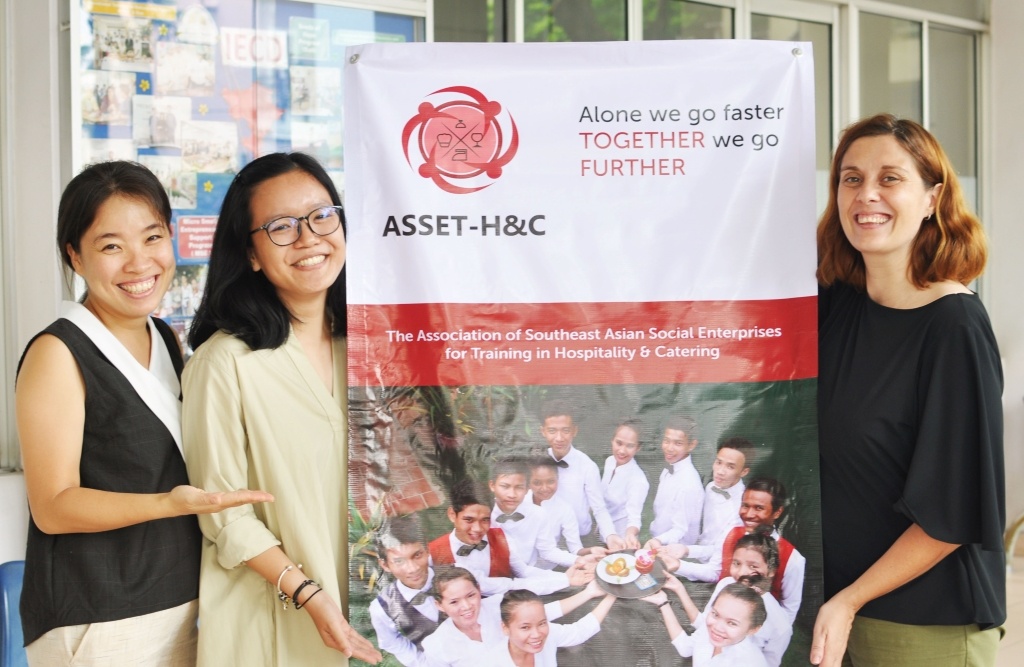
Sophie Hartman, Nguyễn Thị Thu Thảo, and Võ Thị Quế Chi comprise the co-ordination team of the Association of Southeast Asian Social Enterprises for Training in Hospitality & Catering (ASSET‑H&C).
ASSET‑H&C is a regional network of vocational training centres that promote the social and economic inclusion of vulnerable people in Southeast Asia. ASSET‑H&C members work together on their common mission to make a positive impact on the lives of disadvantaged youths and adults.




